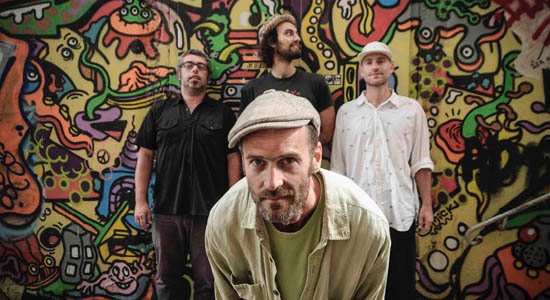|
Socieadade Recreativa
|
|

Sociedade Recreativa
On this project, the trio worked closely with Maga Bo, a Seattle-born electronic producer based primarily in Rio de Janeiro since 1999. The two entities met during the summer of 2014 and began work on the album a year later. They refer to their aesthetic as a “half-way transatlantic sound,” meeting somewhere between the Brazilian regions of Bahia and Perambuco, and Lyon: lyrics of the songs are in Portuguese except where noted, yet the style of songwriting and emphasis on the accordion draws on performance ideals long exploited by both popular French musicians and performers of forró, the Braziilian style of often-celebratory song and dance. Ultimately, the cosmopolitan sensibilities of all participants make this aesthetic possible.
“Boa Noite,” the lead-off track, acclimates us to Sociedade Recreativa's integrated soundworld: the song is driven by pandeiro and zabumba, a two-headed bass drum from Brazil, and featuring vocals shadowed by the rabeca, a combination fairly characteristic of forró. However, featured on vocals is Papet J of longtime Marseille-based reggae group Massilia Sound System, singing in French and Occitan, a regional language of Provence.
Maga Bo's sirens are interpolated throughout, resulting in a propulsive dance track flush with sonic variety. Several other tracks embrace this texture, adding in triangle, another prominent rhythmic element of forró as well as Louisiana Cajun music, which seems to subtly permeate the album (“Sereia,” “Primeira Viagem,” “A Banda”). Inexplicably, the songs heavier in minor sonorities seem to feature more nuanced arrangements, such as in “Fulô de Laranja,” which makes use of sampled horns and electronic swells that challenge the boundaries between acoustic and synthesized sound.
What makes Socieadade Recreativa's associative power so strong are its forays into the ultimate cosmopolitan realm of blurring the traditional and the contemporary, often conceived as distinct and problematized by artists since time immemorial. Notably, “Xote Natural,” which features Rio-born/Paris-based vocalists Flavia Coelho, melds a Manu Chao-tinged accordion vamp over drum machine breakbeats with lyrics in both Portuguese and French. This texture makes way for Coelho's rap passage accompanied by a two-note riff from the berimbau, a musical bow conventionally linked to Afro-Brazilian martial art/dance form capoeira. Both “Vale de Juca” and “Rainha de Alegria” succeed in incorporating elements of rap such as beat production, sampled voices, and percussive vocal flow, into song structures that would be complete but less immediately compelling without them.
Furthermore, non-conventional ways of utilizing certain traditional sounds can mark something as cosmopolitan, as in “Ipajé,” where Alaoua Idir's 'ud assumes a function more akin to the pifano (flute) than the rhythmically propulsive cavaquinho, common in many Brazilian vernacular musics. Additionally, Maga Bo's production on this song make distinctions between the bass tones of the zabumba and synthesized percussion nearly impossible. It is moments like these where Sociedade Recreativa suggests that people like me, formal students of ethnomusicology, quiet our minds for a bit and enjoy these sounds as unadulterated sonic expression of the artists' joy in collaboration. - Dylan McDonnell
Further adventures:
© 2016 RootsWorld. No reproduction of any part of this page or its associated files is permitted without express written permission.
|
|
|
|